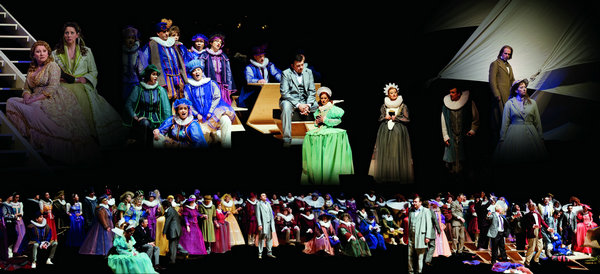
No matter what soothes your soul, the classic or beyond the mainstream, come and be spoiled for choice at the Beijing Music Festival, says Chen Jie.
For music lovers, Beijing has too many choices, from high-brow classical to underground music. But if you want to watch a ping-pong game accompanied by a concerto, you'd better attend this year's Beijing Music Festival.
From Oct 8 to 24, the annual festival will present 16 concerts, two operas and some free children's concerts, master classes and salons.
The opening concert is a dialogue between the West and East. Under the baton of Yu Long, BMF's artistic director as well as China Philharmonic's music director, the orchestra will play two Chinese composers' works and two Western pieces.
Chinese composer Chen Qigang's Instants d'un Opera de Peking borrows Peking Opera's typical tunes xipi and erhuang while blending the percussion instruments of Peking Opera such as the gongs and cymbals into the Western orchestra.
Born in Shanghai in 1951 but living mostly in France since 1984, Chen is the last student of French composer Olivier Messiaen (1908-92). His works feature the rich flavor of Chinese traditional culture interpreted in a modern Western composing technique.
When Chen was young, his father sent him to learn the art of Peking Opera. Though he turned to Western classical music at 16, he never forgot the melodies and typical Peking Opera performing styles.
"Especially, when I left for Paris for further studies, I realized that Peking Opera and other traditional Chinese art forms were in my blood. They have formed my musical vocabulary," Chen says.
The BMF will feature renowned Latvian-born Israeli cellist Mischa Maisky performing young Chinese composer Zou Ye's Variations on Chinese Melody for Cello and Orchestra.
Puccini wrote the Chinese folk song Jasmine into his opera Turandot in 1924 to make it probably the most well-known Chinese melody in the world. During its tour of the Vatican in May 2008 to perform for Pope Benedict XVI, the China Philharmonic Orchestra played this piece after Mozart's Requiem.
The BMF commissioned Zou to interpret the old melody into a modern cello concerto.
"As a leading music festival in China, I think we have the responsibility to commission works," says Yu. "Music is an art that passes from one generation to another. We had Mozart and Beethoven and the classical works. Now we need to find emerging talents and help them create great works."
Yu is artistic director of not only the BMF, but also Music in the Summer Air festival in Shanghai, China Philharmonic Orchestra, Guangzhou Symphony Orchestra and Shanghai Symphony Orchestra.
Every year his institutions commission a number of new works. For example, Instants d'un Opera de Peking was commissioned by Shanghai Symphony Orchestra to open its new concert hall last September. The Guangzhou Symphony Orchestra commissioned another famous Chinese composer, Tan Dun, to write piano concerto Farewell My Concubine to close its last season on July 31.
Maestro Charles Dutoit told China Daily in an interview in Beijing in July that, if not for Yu and the Beijing Music Festival, classical music would not be flourishing in China now.
His latest interesting commission is the Ping Pong Concerto by 36-year-old American composer Andy Akiho. Co-commissioned by the BMF and Music in the Summer Air, the piece premiered in Shanghai in July and will reverberate at Beijing's Poly Theater on Oct 22.
It's a piece that commemorates the ping-pong diplomacy between the United States and China in the early 1970s which paved the way for then US president Richard Nixon's visit to Beijing. The concerto will feature New York Philharmonic violinist Elizabeth Zeltser and two ping-pong players in real life, Michael Landers and Ariel Hsing.
"Competitive players Michael Landers and Ariel Hsing volleyed along in approximate tempo, first with paddles, then tambourines and wine glasses, and - as a cadenza - against a bass drum and a gong. So riveting was the piece as visual theater that no one seemed to keep score," music critic Ken Smith who attended the premiere in Shanghai wrote in his column for Financial Times.
Other highlights of this year's BMF include two Wagner operas, The Master-Singers of Nuremberg and Tristan and Isolde. Both are productions of Austrian Tirol Festival Erl and both will be performed in China for the first time.
The BMF has held many premieres since it started in 1998. Another China premiere this year will be the closing concert which will have maestro Peter Ruzicka conducting the Estonia National Male Choir, International Choral Academy Lubeck, Shanghai Opera House Choir and Shanghai Symphony Orchestra for Arnold Schoenberg's strange yet fascinating mega-cantata Gurrelieder.
Chinese music and musicians have always been a major element of the BMF. This year, the treat includes performances by cellists Wang Jian and Zhu Yibing, violinist Xu Weilin, pianist Zhu Xiaomei and female musician Liu Suola.





